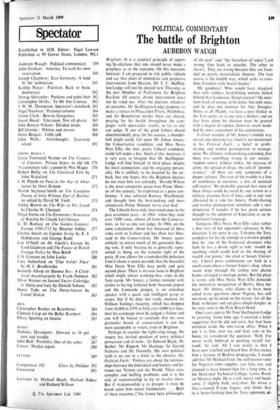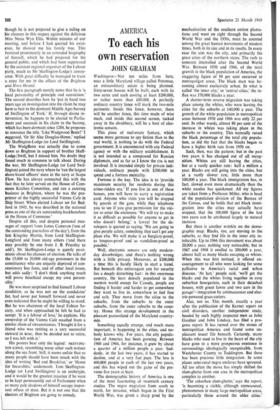The battle of Brighton
POLITICAL COMMENTARY
AUBERON WAUGII
Brighton—It is a cardinal principle of report- ing by-elections that one should never make a prophecy as to the outcome. On this occasion, however, I am prepared to risk public ridicule and say that short of immediate and purposive intervention from Heaven, Mr T. C. Skefling- ton-Lodge will not be elected next Thursday as the new Member of Parliament for Brighton Pavilion. Of course, divine intervention must not be ruled out. After the election, whatever its outcome, Mr Skeffington-Lodge proposes to make a retreat in Pluscarden Priory, Perthshire, and the Benedictine monks there are already praying for his health throughout the cam- paign—with spectacular results, so far as one can judge. If one of the good fathers should absentmindedly pray for his success, a thunder- bolt might easily fall upon Mr Julian Amery, the Conservative candidate, and Miss Nesta Wyn Ellis, the nice, pretty Liberal candidate, could fall under a bus. Short of this, however, it is very easy to imagine that Mr Skeffington- Lodge will find himself in third place, despite his local connections and his engaging person- ality. He is unlikely to be daunted by the set- back, but one hopes that the Brighton electors do not treat him too unkindly. 'Harold Wilson is the most competent peace-time Prime Minis- ter of the century,' he explained at a press con- ference. also admired Ramsay MacDonald, and thought him the best-looking and most aristocratic Prime Minister we've ever had.'
The Liberals have only intervened once in the past seventeen years—in 1964—when they stole over 7,000 votes, almost all from the Conserva- tives, so far as one can judge. In 1966, on the same calculation, about five thousand of these votes went to Labour and less than two thou- sand to the Conservatives. Mr Amery seems unlikely to attract much of the genuinely float- ing vote, if only because he is generally repre- sented as being on the extreme right of the party. If one allows for a considerable defection from Labour it seems possible that the beautiful Miss Nesta Wyn Ellis may profit and gain second place. There is no race issue in Brighton which might attract working-class votes to the Tory camp. Mr Amery, a former minister with claims to having fathered both Stansted airport and the Concorde project, is an articulate speaker with a quick and intelligent grasp of issues; but if he does not vastly increase Sir William Teeling's majority, which has dropped from 16,000 in 1959 to little over 6,000 last time, then his campaign must be judged a failure and one will be forced to conclude that his own particular brand of conservatism is not the most acceptable to voters, even in Brighton.
Perhaps to counter the right-wing image, Mr Amery has invited speakers of every political persuasion and of none: Sir Edward Boyle, Mr Barber, Mr Rippon, Mr Hastings, Sir Gerald Nabarro and Mr Donnelly. His own political faith is set out in a letter to the electors, My Political Faith: 'Politics are about the relation- ships between the Individual and Society and be- tween our Nation and the World. These raise complex and baffling problems, and it is the task of statesmanship to try to resolve them. But if statesmanship is to prosper it must be based upon firm moral foundations. . . . Both of these extremes ["the laissez faire philosophy of the past" and "the Socialism of today"] are wrong. One leads to anarchy. The other to slavery. They are wrong because they are foun- ded on purely materialistic theories. The true course is the middle way, which seeks to com- bine Freedom with Social Justice.'
My goodness! Who would have imagined that such ruthless, hard-hitting notions lurked behind that handsome, bland exterior? He men- tions God, of course, in his letter, but only once, and he does not mention Sir Alec Douglas- Home at all. Plainly, we have a new thinker in the Tory party, or at any rate a thinker, and on that basis alone his election must be greeted with a degree of rapture, however much modi- fied by one's assessment of his conclusions.
A closer scrutiny of Mr Amery's middle way reveals one idiosyncrasy which is not mentioned in his Political Faith: a belief in profit- sharing and worker participation in manage- ment. We all knew, without being reminded,,that there was something wrong in our society: 'student unrest, wildcat strikes, the increase of crime, the spread of drugs, the cult of "permis- siveness"—all these arc only symptoms of a deeper sickness. The root of the trouble is a loss of confidence in ourselves, a loss of national self-respect.' We probably guessed that most of these things could be cured by our return to a military presence East of Suez, and at any rate alleviated by a vote for Amery. Profit-sharing and worker participation somehow add a new dimension. I wonder if he has given serious thought to the adoption of Esperanto as an in- ternational language.
Gorgeous Miss Nesta Wyn Ellis takes rather a dim view of her opponent's advocacy in this direction, I am sorry to say. 'I despise the Tory candidate for his sly attempt to convince people that he -one of the backward dreamers who feels he has a divine right to rule—would do anything which could lead to the sharing of wealth and power,' she cried at Sussex Univer- sity. Liberal press conferences are held in a small room above a former baker's shop, where water drips through the ceiling into plastic basins arranged at strategic points. But the place is warm, and Miss Nesta Wyn Ellis demands the immediate recognition of Biafra, bless her heart. Mr Amery, who claims to have been asked many questions about Nigeria, has still not made up his mind on the matter, for all the flock wallpaper and cut-glass dingle-dangles in his tony suite at the Park Royal Hotel.
One's eyes turn to Mr Tom Skeffington-Lodge in yearning. Some time ago, I received a letter suggesting that he did not exist, but had been invented inside the SPECTATOR office. When I put it to him, over tea and fruit cake in his home, he considered the question. 'Well, I've never really believed in pushing myself for- ward,' he said. All I can testify is that I have seen, touched and heard him. If that makes him a figment of Biafran propaganda, I would add that Mr Michael Foot, the well-known voter for Nigerian arms supplies, saw him, too, and claimed to have known him for a long time, at the Municipal Technical College, Lewes Road, on Monday night. He is a tall, merry and hand- some, if slightly bald, sixty-four. He drives a lilac-coloured E-type Jaguar, and thinks that he is better-looking than his Tory opponent, al- though he is not prepared to give a ruling on his chances in this respect against the delicious Miss Nesta Wyn Ellis. Within minutes of our meeting, and before I bad queried his exist- ence, he showed me his family tree. This featured prominently in an extended biography of himself, which he had prepared for the general public, and which had been suppressed by the assistant regional organiser of the Labour party, much to Mr Skeffington-Lodge's annoy- ance. With great difficulty he managed to trace a copy for me in the offices of the Brighton and Hove Herald.
The first paragraph merely notes that he is 'a local personality of principle and conviction.' The second describes how he 'put in hand two years ago an investigation into the claim he may have as heir to the dormant Middle Ages barony of Swillington of York.' If, through divine in- tervention, he happens to be elected to Parlia- ment and succeeds in his claim to the barony, which has been dormant since 1284, he proposes to renounce the title. 'Like Wedgwood Bean?' I suggested, 'Or Sir Alec Douglas-Home,' replied Mr Skeffington-Lodge (or Lord Swillington).
The WedgBenn was actually due to come down to Brighton in support of brother Skeff- Lodge/Swill, but I missed him. No doubt they found much in common to talk about. During the war, Mr Skeffington-Lodge (or Lord Swil- lington) joined the navy where he 'ran the largest shore-based officers' mess in the navy at Scapa Flow. He has always connected this with the fact that he later served on the House of Com- mons Kitchen Committee, and ran a catering business in Brighton, where he was the pro- prietor of the highly successful Vienna Cafe in Ship Street. When elected Labour MP for Bed- ford in 1945, he was described in the national press as one of the six outstanding backbenchers in the House of Commons.'
Despite all this, and despite personal mes- sages of support from James Cameron Cone of the outstanding journalists of the day'), from the late Kingsley Martin, from Lord Skeffington- Longford and from many others (`and there may possibly be one from J. B. Priestley to add'), Mr Skeffington-Lodge is quietly pessi- mistic about his chances of election. He talks of the 15,000 to 20,000 old-age pensioners in the constituency who are unjustly deprived of con- cessionary bus fares, and of other local issues, but adds sadly: 'I don't think anything much will prove beneficial except my own person- ality.'
He was most surprised to find himself Labour candidate, as he was not on the candidates' list, had never put himself forward and never even indicated that he might be willing to stand. But he was chairman of the local Fabian So- ciety, and when approached he felt he had to accept. 'It is a labour of love,' he explains. His ownership of the Vienna Cafe resulted from a similar chain of circumstances. 'I bought it for a friend who was retiring as a very successful steward in BOAC, then he decided not to retire, so I was left with it.'
His posters bear only the legend : SKEFFING- lox LODGE, resembling many other such notices along the sea front. Still, it seems unfair that so many people should have been struck with the idea of writing 'Bed and Breakfast,' or 'Home for Incurables,' underneath. Tom Skeffington- Lodge (or Lord Swillington) is an archetype, and it would be the greatest injustice if he were to be kept permanently out of Parliament when so many pale shadows of himself occupy impor- tant offices of state. But it is not one that the electors of Brighton are going to remedy.











































 Previous page
Previous page